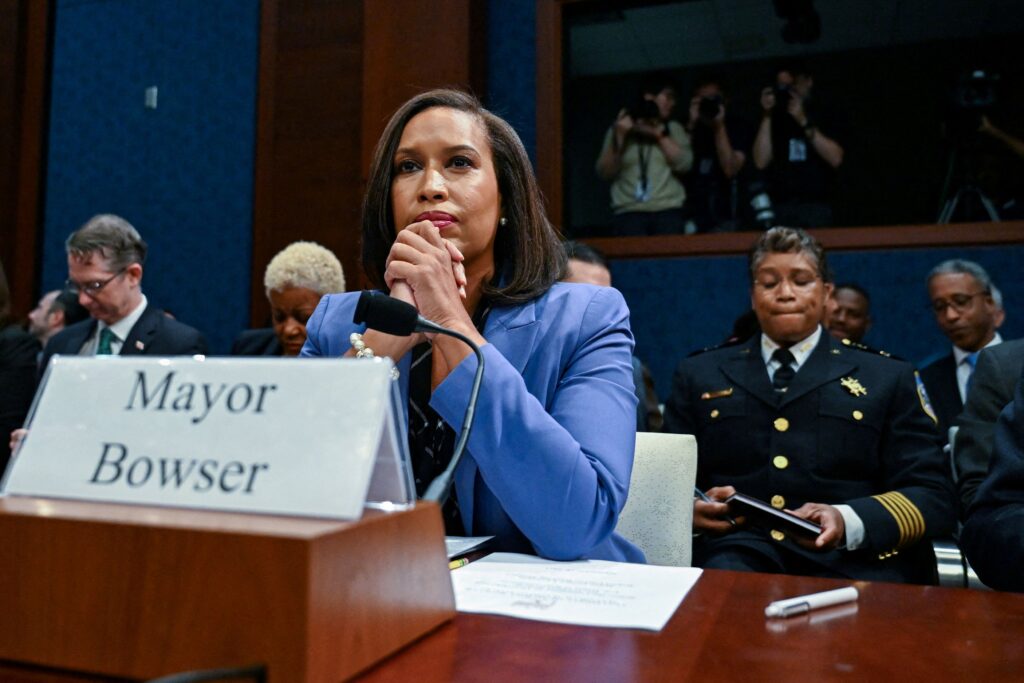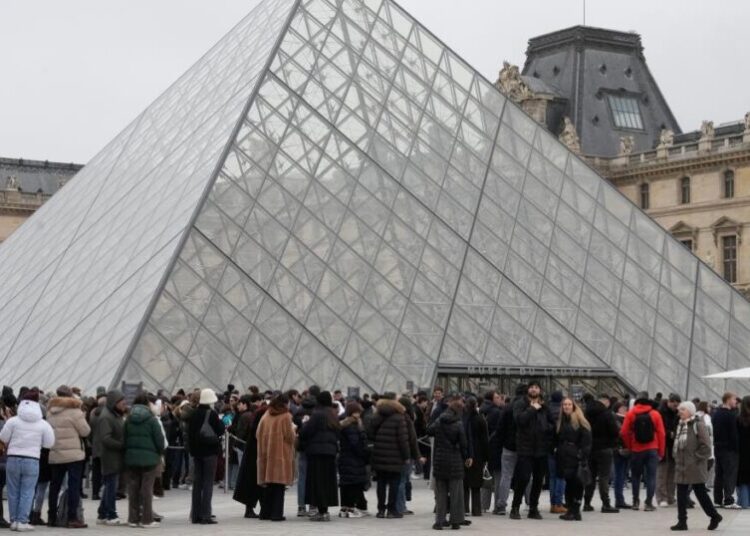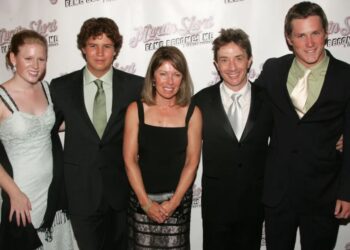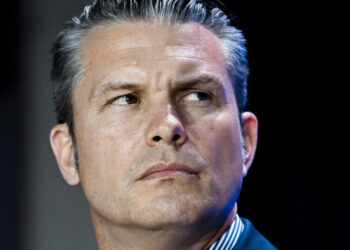In a city where a recent poll showed that just over half of residents approved of her job performance, the news on Tuesday that D.C. Mayor Muriel E. Bowser (D) would leave office after her third term was bound to produce mixed reactions.
Near universal, however, was agreement on the high stakes of what comes next for the District.
The upcoming political shake-up — a mayor’s race next year without an incumbent, alongside a smattering of other open seats in elected office — arrives as the nation’s capital faces unprecedented assaults on its autonomy from President Donald Trump and Republicans in Congress. Added to that is an economic downturn caused in part by federal spending cuts that have included mass layoffs of federal workers.
With Bowser’s departure, D.C. voters will select their first new mayor in more than a decade at one of the most fragile moments in the city’s 50-year history of home rule.
“We’re at a crossroads now with so much uncertainty — so many of our residents work for the federal government — and uncertainty with this administration and the economy,” said Yvette M. Alexander, a former D.C. Council member who represented Ward 7, which includes parts of Northeast and Southeast Washington “The next mayor will have to strike that perfect balance: Bring back the business community, support them and support our residents whose finances have been crippled. It’s going to be a real challenge.”
Bowser was already an experienced mayor by the time these crises emerged; she had, after all, already led the city through others.
While the first part of her tenure was one of rising economic prosperity, where development was booming and the city’s tax revenue increasing, that momentum was halted by a pandemic that has had lasting effects on the city’s economy — particularly its affordable housing market and its downtown economic engine, which was upended by the rise of remote work.
Then came Trump’s second term, which kicked off this year with an escalating focus on D.C., including threats that he would “take over” the city. His tough talk took on new meaning in August when he declared a crime emergency, seized temporary control of the city’s police department and ordered the National Guard to patrol city streets.
Bowser said in an interview this week that navigating the Trump administration was not a factor in her decision. She had “accomplished what we set out to accomplish,” she said, achieving some of her biggest goals as mayor — including her $3.7 billion deal with the Washington Commanders to redevelop the RFK Stadium site. It was time, she said, to let someone else do the job.
City residents, local elected officials and political observers were split over the legacy she leaves behind.
Council Chairman Phil Mendelson (D), Bowser’s legislative branch counterpart since she first took office in 2015, said Tuesday that he had heard rumors for “quite some time” that the mayor’s third term would be her last.
“Having her confirm it makes me think about her 12 years of service, which is actually a lot of commitment,” he said in an interview, referring to the time Bowser will have spent in office when she leaves. “And just reflecting on how especially the last 10 months have been really hard.”
The surge of federal law enforcement to D.C. that began this summer and still continues cemented Bowser’s legacy as a mayor who navigated the city through some of its toughest challenges in recent memory. Bowser’s response to Trump — muted, pragmatic and at times collaborative during heightened immigration enforcement and a heavy federal police presence that unnerved some D.C. neighborhoods — also was divisive.
Bowser repeatedly emphasized home rule, the limited form of self-government Congress granted the city in 1973, which some federal lawmakers have threatened to take away, as her “North Star.” She saw it as a success that Trump backed off his threats to push Congress to extend his emergency after she offered long-term coordination with federal law enforcement. But she has remained unable to extricate her police department from joint patrols with federal immigration authorities, producing prolonged tension with immigrant communities and activists who have begun to disrupt her public events.
For Keya Chatterjee, co-founder of Free DC — perhaps the most visible local organization resisting federal incursions on local affairs — Bowser’s unwillingness to push back against the Trump administration more forcefully was a betrayal.
“What we want in a next mayor is someone who will not capitulate to demands to take away our rights and to harm the people of D.C.,” Chatterjee said. “A show of strength is a powerful message to a bully, and we have that kind of strength in D.C. … We need a leader that stands with us.”
Others, even those critical of the mayor in other spheres, have had more sympathy.
“The problem is that because we don’t have statehood, and because they are attacking home rule, she’s in between a rock and a hard place,” said Ambrose Lane Jr., a Ward 7 resident and civic leader. “I don’t really blame her for that.”
For Lane — who chairs the advocacy group Health Alliance Network and serves as president of Million Man Vote, an organization focused on getting Black men to participate more in elections — Bowser’s legacy is mixed. While he applauded Bowser as a champion of development and economic growth, he said that growth felt unequal. In D.C.’s next mayor, Lane said, he would be looking for someone who could more effectively tackle the city’s poverty and racial inequality.
Bowser has touted her investments in Ward 8, an underserved area in Southeast Washington where she said she kept her promises — by delivering a new hospital and investing in developments such as St. Elizabeths in Congress Heights and the MLK Gateway in Anacostia.
But Lane said she didn’t go far enough to address unequal access to housing, jobs and health care along lines of race and income.
“Yes, there were some businesses that were developed in downtown Anacostia, but all you have to do is go two blocks away and you have fentanyl, you have crime … and you have, again, joblessness,” he said.
In that Anacostia neighborhood, Terry Gaston, 67, a lifelong District resident, said he saw Bowser’s leadership improve conditions. “She spent a lot of money in Southeast, and that money wasn’t coming in before,” he said.
She had earned a break, he added. “She deserves to go home and rest in her rocking chair.”
The business community is one constituency that will miss the mayor, said Kevin Clinton, chief program officer at the Federal City Council, a business advocacy group that has long exerted influence over city affairs.
He said Bowser’s understanding of the connection between economic growth and D.C.’s long-term health — and her willingness to approach it in a “nonideological way” — made her especially valued among civic groups.
“She was in many ways the leader that D.C. needed in the times we were living through,” Clinton said, citing Bowser’s focus on housing, economic recovery and managing the city’s strained relationship with the federal government.
Looking ahead, Clinton said, the next mayor will need to be a thoughtful leader who can build consensus across sectors while investing in the fundamentals: education, transportation and public safety.
Amid the city’s economic uncertainty and its fragile relationship with Congress, several observers said the stakes of the upcoming election are unusually high — shaped as much by national politics as by local ones.
“So much of what happens in the city will be determined by what happens in the congressional races,” said Michael K. Fauntroy, a political science professor at George Mason University. If Democrats gain at least one chamber, D.C. could face less federal interference.
He said the moment recalls 1990, when Del. Eleanor Holmes Norton (D-D.C.) first ran, and both the delegate’s and the mayor’s race were sharply contested.
In recent months, several of D.C.’s 13 council members have expressed interest in both seats, potentially reshaping the city’s political structure. The attorney general’s office also will be on the 2026 ballot.
George Derek Musgrove, an associate professor of history at the University of Maryland, Baltimore County and co-author of “Chocolate City: A History of Race and Democracy in the Nation’s Capital,” warned that the next mayor also will have to navigate a uniquely fraught relationship with the White House — namely a president who “uses the city as a whipping boy.”
“No mayor has had to deal with someone like that,” he said of Bowser. “She’s done a reasonably good job managing it, but she’s smart enough to know it’s an untenable position.”
Erin Mosby, 38, who lives in Southeast Washington, is among the residents ready for a change.
“Good. G-O-O-D exclamation point!” she said when told of the mayor’s decision shortly after it was announced. “I’m glad she’s going. That will give someone else with some fresh eyes a chance to run the city.”
Mosby, who works in patient services at a health care facility, said she wanted a mayor who would focus more on programs and activities for children and teenagers in the city, like the ones she had while growing up.
“We had an after-school program in my apartment building. I took cello lessons for five years,” Mosby said. “There’s nothing for kids these days.”
Alexander, the former council member, said that no matter what, in early January 2027, D.C. is likely to wake up to new leadership in several spheres. With it, she predicted, will be a rare jolt of possibility in a city that yearns for it.
“It’s going to be crazy — an open mayor’s race, potential changes on the council, maybe the chairman,” she said. “It brings a new breath, new energy, new fire to the city. We’ve been kind of complacent since covid. This shakes things up, and I think that’s exciting.”
The post With Bowser on her way out, D.C. braces for its uncertain future appeared first on Washington Post.




